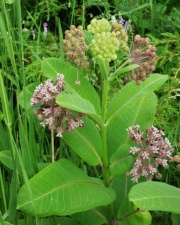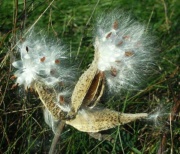Difference between revisions of "Milkweed fiber"
Jump to navigation
Jump to search
(username removed) |
|||
| (7 intermediate revisions by 3 users not shown) | |||
| Line 1: | Line 1: | ||
| − | [[File:milkweedf5.jpg|thumb|Common milkweed | + | [[File:milkweedf5.jpg|thumb|Common milkweed ''Asclepias syriaca'']] |
| − | |||
| − | ''Asclepias syriaca'']] | ||
== Description == | == Description == | ||
| − | Fibers obtained from the seeds of any of several milkweed plants of the genus ''Asclepias''. Milkweeds are a native perennial in North America. The seed pods produce a silky lightweight fuzz, called silk or floss. The lustrous, soft fibers are yellowish white in color. Milkweed fibers are too brittle to spin and are used for upholstery padding. They also have good buoyancy and were used as substitutes for [http://cameo.mfa.org/ | + | Fibers obtained from the seeds of any of several milkweed plants of the genus ''Asclepias''. Milkweeds are a native perennial in North America. The seed pods produce a silky lightweight fuzz, called silk or floss. The lustrous, soft fibers are yellowish white in color. Milkweed fibers are too brittle to spin and are used for upholstery padding. They also have good buoyancy and were used as substitutes for [[kapok|kapok]] in lifebuoys during World War II. |
| − | + | [[File:MilkweedSeedsf5.jpg|thumb|Common milkweed seed ''Asclepias syriaca'']] | |
| + | * For milkweed fiber identification, see http://cameo.mfa.org/wiki/Category:FRIL:_Plant_Fibers | ||
== Synonyms and Related Terms == | == Synonyms and Related Terms == | ||
| − | ''Asclepias''; vegetable silk; milkweed floss; milkweed fibre (Br.); | + | ''Asclepias''; vegetable silk; milkweed floss; milkweed fibre (Br.); asclépiade (Fr.); zijdeplant (''Asclepias syriaca'') (Ned); |
| − | |||
| − | |||
| − | + | == Risks == | |
| − | == | ||
| − | |||
| − | |||
| − | |||
| − | |||
The sap and leaves of the plant are toxic to all mammals. | The sap and leaves of the plant are toxic to all mammals. | ||
| − | == | + | == Physical and Chemical Properties == |
| − | + | Fiber length = ~ 2 cm | |
== Additional Images == | == Additional Images == | ||
<gallery> | <gallery> | ||
| − | File:42 milkweed 200X pol.jpg|Milkweed | + | File:42 milkweed 200X pol.jpg|Milkweed fibers at 200x polarized light |
| − | File:42 milkweed 200X.jpg|Milkweed | + | File:42 milkweed 200X.jpg|Milkweed fibers at 200x transmitted light |
File:milkweedfiberslarge.jpg|Milkweed fiber | File:milkweedfiberslarge.jpg|Milkweed fiber | ||
</gallery> | </gallery> | ||
| + | ==Resources and Citations== | ||
| − | + | * R.King, E.Hartley, "Unusual Fibers Used in Northwest Coast Ethnographic Textiles, Their Preparation & Their Structure", ''Technology & Conservation'', 1/79. | |
| − | * | + | * J.Gordon Cook, ''Handbook of Textile Fibres:I Natural Fibres'', Merrow Publishing Co. , Durham, England, 1984 |
| − | * | + | * Poisonous Plants at http://cal.vet.upenn.edu/poison/plants/ppmilkw.htm (Accessed Nov. 9, 2005) |
| − | * Wikipedia | + | * Wikipedia: http://en.wikipedia.org/wiki/Milkweed (Accessed Nov. 9, 2005) |
| − | * | + | * Random House, ''Webster's Encyclopedic Unabridged Dictionary of the English Language'', Grammercy Book, New York, 1997 |
* ''The American Heritage Dictionary'' or ''Encarta'', via Microsoft Bookshelf 98, Microsoft Corp., 1998 | * ''The American Heritage Dictionary'' or ''Encarta'', via Microsoft Bookshelf 98, Microsoft Corp., 1998 | ||
Latest revision as of 14:46, 18 October 2022
Description
Fibers obtained from the seeds of any of several milkweed plants of the genus Asclepias. Milkweeds are a native perennial in North America. The seed pods produce a silky lightweight fuzz, called silk or floss. The lustrous, soft fibers are yellowish white in color. Milkweed fibers are too brittle to spin and are used for upholstery padding. They also have good buoyancy and were used as substitutes for Kapok in lifebuoys during World War II.
- For milkweed fiber identification, see http://cameo.mfa.org/wiki/Category:FRIL:_Plant_Fibers
Synonyms and Related Terms
Asclepias; vegetable silk; milkweed floss; milkweed fibre (Br.); asclépiade (Fr.); zijdeplant (Asclepias syriaca) (Ned);
Risks
The sap and leaves of the plant are toxic to all mammals.
Physical and Chemical Properties
Fiber length = ~ 2 cm
Additional Images
Resources and Citations
- R.King, E.Hartley, "Unusual Fibers Used in Northwest Coast Ethnographic Textiles, Their Preparation & Their Structure", Technology & Conservation, 1/79.
- J.Gordon Cook, Handbook of Textile Fibres:I Natural Fibres, Merrow Publishing Co. , Durham, England, 1984
- Poisonous Plants at http://cal.vet.upenn.edu/poison/plants/ppmilkw.htm (Accessed Nov. 9, 2005)
- Wikipedia: http://en.wikipedia.org/wiki/Milkweed (Accessed Nov. 9, 2005)
- Random House, Webster's Encyclopedic Unabridged Dictionary of the English Language, Grammercy Book, New York, 1997
- The American Heritage Dictionary or Encarta, via Microsoft Bookshelf 98, Microsoft Corp., 1998




